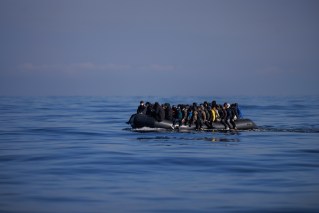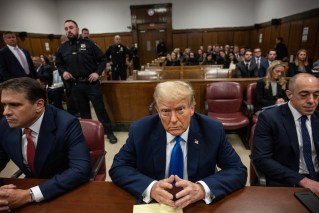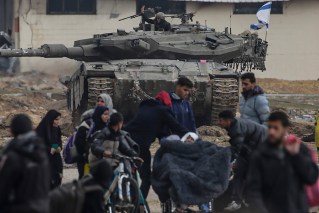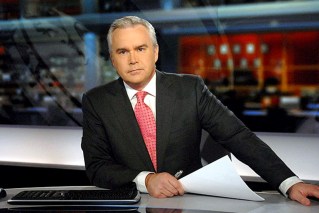‘Silent killings’: Young Iraqis want the world to know their suffering
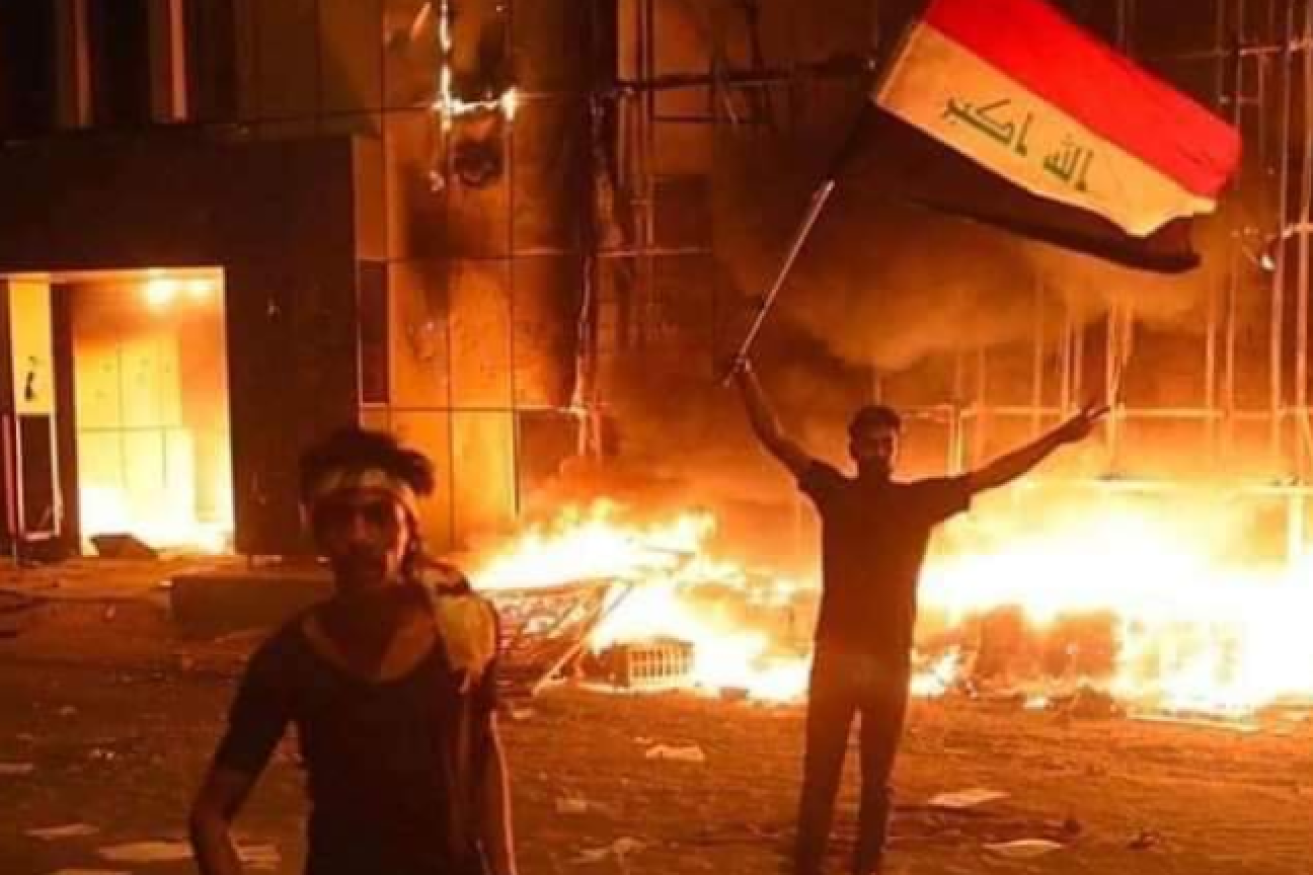
Two young protesters raise the Iraq flag and call for the government to stand down. Photo: Thomas van Linge/Twitter
Facing the prospect of death by overhead snipers, young Iraqis are vowing to continue their uprising until the government improves living standards and stamps out corruption.
Latest figures show the number of protesters shot dead on the streets of Iraq this month has topped 100, and more than 7000 have been injured.
Human rights groups expect the death toll to rise.
But in their fight for jobs, and basics like power, internet and clean drinking water, the Iraqi youths remain undeterred by the threat of violence.
Pressure on security forces to take responsibility for the deaths of the protesters, who are mainly young men, has prompted Prime Minister Adel Abdul-Mahdi to order an official probe into the killings.
Mr Abdul-Mahdi said a commission would be set up to investigate and seek justice against soldiers who illegally opened fire on protesters.
It comes after local media reported police snipers positioned themselves on rooftops and fired indiscriminately at crowds.
Young people who The New Daily spoke to said they had been hurt by the world’s “silence” on the violence, adding their plight had received little global coverage despite footage of the atrocities.
A young man being shot at during an interview is just one of many disturbing videos circulating widely on social media.
In a shocking scene of unrest, the male protester wearing a white T-shirt and goggles on his head can be seen angrily talking on camera before being struck by a bullet.
The video shows his body being dragged away by other protesters who come to his aid. Another young man can be seen lying motionless on the ground, blood spilling from his body.
It has since emerged that journalists documenting the bloodshed were beaten and TV news stations were raided.
https://twitter.com/LizSly/status/1180816082363408389
What are they fighting for?
Brothers Saif, 20, and Ali, 23, say they will continue to risk their lives so that civilians can finally start to reap the economic benefits of living in an oil-rich country.
Their older brother Adam Alzahabi lives in the US and has had minimal contact with the pair since Iraq temporarily shut down the internet for 70 per cent of the country.
Speaking to The New Daily, the civil engineering graduate from the University of Houston said Saif and Ali “have to protest to save their future”.
“They will continue until they die or they change the government system,” he said.

Saif and Ali finished high school but chose not to pursue higher education because most Iraqi graduates haven’t been able to secure jobs. Photo: Adam Alzahabi
Mr Alzahabi’s wife Haneen is also in Baghdad.
A software engineer, Haneen is living without electricity and the internet.
“She is so damn scared,” Mr Alzahabi said.

Mr Alzahabi is trying to get a visa for his wife Haneen. Photo: Adam Alzahabi
Government figures suggest at least 110 people have been killed and more than 7300 injured since protests erupted in the Iraqi capital in early October.
The war-torn country possesses what the International Monetary Fund deems is the world’s fourth-largest oil reserves, but most of its civilians don’t have access to a clean water supply, power, basic healthcare or education.
The protests, which rapidly spread to the country’s south, have been made up of largely young people dissatisfied with the 25 per cent youth unemployment rate.
The World Bank reported that almost a quarter of Iraq’s 40 million people were living on less than $US1.90 ($2.80) a day in 2014.
After six days of unrest, Iraq’s military admitted that unarmed protesters were subjected to “excessive force”.
But while the authorities took responsibility for some of the violence, they also blamed “unidentified snipers” according to Al Jazeera reporters.
But human rights advocates say authorities are responsible either way: Security forces either fired upon the demonstrator or they failed to protect the crowds from the apparent “snipers” who infiltrated the protests.
Young Iraqis want the world to pay attention
“Genocide” has been under way in Iraq and the international community doesn’t appear to care, said 34-year-old Baghdad resident Mukhallad Fadaam.
Mr Fadaam said: “The protesters were killed twice – once by the authorities and once by world silence.”
“I haven’t seen a real international reaction so far, except for the timid United Nations statement.”

Mr Fadaam supports the protests in Iraq. Photo: Mukhallad Fadaam
He has participated in most of the protests since 2003 when US forces invaded Iraq and overthrew dictator Saddam Hussain.
Mr Fadaam said this was the worst kind of violence he’s seen perpetrated against Iraqi protesters as they were “non-politicised protests” with “no one behind them”.
“They (Iraq’s government) isolated Iraq from the outside world and then used all force towards peaceful protesters.
“They used weapons they bought with money from the people, to kill the people.”
Shvan Rasool, 31, from northern Iraq, said there has been a continuous call by Iraqis to the international community to stand with them but sadly they have stayed silent.

Mr Rasool works in social media and wants to see political reforms in his home country. Photo: Shvan Rasool
He believes “little changes will be made”.
“I’m as pessimist are other Iraqis … the government has promised to do some reforms, but people are fed up with empty words and promises.”
Watch the last footage taken by a local Iraqi cameraman. The guy was a freelances covering the ongoing demonstrations, but just like every living creature walking on street, he was shot by a sniper! Thanks to his courageous work, we know what is happening in #Iraq. #IraqProtests pic.twitter.com/Q4OD88GS3y
— بن هباس 🇸🇦 (@5a1di) October 6, 2019
https://twitter.com/AdamAlzahabi/status/1181041487448088576
Behind Iraq’s deadly protests
Dr Benjamin Isakhan, Deakin University associate professor specialising in Middle East politics, said anti-government protests had become a “prominent feature of Iraq’s political landscape”.
“It’s been happening every week and every year since 2003,” Dr Isakhan said.
“In 2010 for example, there were massive shootings of protesters. They used anti-terror legislation – they still do it – to basically say the protesters are enemies of the state so they fire on them as if they’re ISIS.”
Since the toppling of Saddam Hussain, many political elites have lived outside the country and are seen to be “out of touch with contemporary Iraq”.
In the past 15 years, political leaders have failed to create a sense of hope and opportunity for Iraq’s youth, Dr Isakhan said, with protests tending to erupt at the end of the country’s “long and brutal” summers.

Protesters burn tyres during a demonstration against state corruption, failing public services and unemployment in the Iraqi capital. Photo: AFP
“A lot of people don’t have electricity, therefore don’t have air-conditioning and by the end of summer, they’ve really had enough and they’re very fed up,” he said.
Tensions have only heightened since the terror group ISIS was defeated in Iraq in 2017.
“Iraqis, particularly young Iraqis, haven’t seen the political elites lead them out of it into a brighter future beyond ISIS,” Dr Isakhan said.
Protesters are frustrated with the fact that Iraq generates billions of dollars annually from oil exports, making it one of the wealthiest countries in the world, yet that wealth has not trickled down into basic public services such as schools, hospitals and clear drinking water.

Injured protesters receive medical treatment at a hospital after intervention of the security forces in demonstrations in Baghdad. Photo: Getty
Civilians have generally been led to believe that politicians are pocketing the money coming in from oil sales.
When Mr Abdul-Mahdi was democratically elected in October 2018, he promised long-term economic and social reforms and improved living conditions, particularly for the poor.
But “that has not happened” and protesters “really want” a “clean out of the government all together”, according to Middle East specialist Professor Amin Saikal from the Australian National University.
While Iraq is a democracy, civilians are unhappy that “people are appointed to important positions on the basis of ethnic, sectarian, factional and family connections, rather than on the basis of merit”, Dr Saikal said.
The security situation has remained “very, very fragile”, he added.
Dr Isakhan said protests flare up easily because police and security forces are “so little” and “so ineffective”, making it “hard to quash them”.

Iraqi security forces opened fire at hundreds of protesters in central Baghdad. Photo: AAP
“Once they quash them, people sort of crawl back into their homes and forget about it for a while,” he said.
“But I don’t know that will happen this time. It could take on a whole new direction and momentum.”
